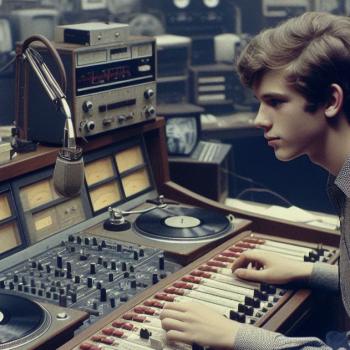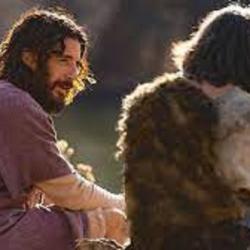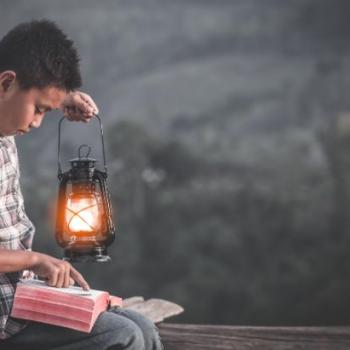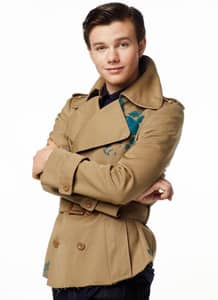 As I watched this episode, so many emotions flooded my soul. For the record, I know it is not real, however, it evoked real emotion. Here is this kid who has always felt on the outs, never fitting in, never being accepted or having it easy. He and his father have found a rhythm and suddenly his father is gone. Suddenly he is literally all alone in the world and the religious world has pushed him further away. To me, this spoke to our single-mindedness when it comes to faith. We are right. No one else has a valid point anymore. It’s not A way, it’s THE way. Have we really gotten to a place where there is no room in our hearts for people who are different from us? Do we no longer celebrate all the intricate differences that make us who we are? Can we not find a moment to say, its okay that you are different, come pray with me anyway? It feels like some groups are so stuck on this “must save” mission that they forget about the humanity. Stop trying to live for after you die; start living for today.
As I watched this episode, so many emotions flooded my soul. For the record, I know it is not real, however, it evoked real emotion. Here is this kid who has always felt on the outs, never fitting in, never being accepted or having it easy. He and his father have found a rhythm and suddenly his father is gone. Suddenly he is literally all alone in the world and the religious world has pushed him further away. To me, this spoke to our single-mindedness when it comes to faith. We are right. No one else has a valid point anymore. It’s not A way, it’s THE way. Have we really gotten to a place where there is no room in our hearts for people who are different from us? Do we no longer celebrate all the intricate differences that make us who we are? Can we not find a moment to say, its okay that you are different, come pray with me anyway? It feels like some groups are so stuck on this “must save” mission that they forget about the humanity. Stop trying to live for after you die; start living for today.
One thing that really struck me in this episode was the ripple effect it had on the other characters. It forced them to either firmly entrench themselves in their stated beliefs or reevaluate them. Rachel, the lead gal and main Jew, had the discussion that (more or less) any Jewish girl has with a non-Jewish boyfriend. How will we raise the kids? To her, she didn’t have a problem being with and potentially setting up a future with a non-Jewish boy (but let’s be honest, they are what? sophomores in high school? juniors?) as long as her kids were raised Jewish.
Meanwhile, Finn is having a crisis of religion based on a grilled cheese sandwich. Beyond the absurdity and similarity to real life situations, what is his deal? He’s lost. He lost his identity when he lost his role as quarterback. How many times have we looked for signs in everything we do when we are wandering aimlessly? Finn, like many of us, took it to the absurd terminal point. He asked Grilled Cheesus for three wishes (mistaking Cheesus for a genie, apparently). He asked for three material needs and he got them. But he never turned that energy toward Kurt who was in pain for his father. Rather he chose the selfish path.
How often do we forget that list of sick people being passed around in synagogue or church but we always seem to remember to pray for a good grade, success in business, or something else physical? It is always so easy to remember what is right in front of us, yet rarely is that what is desperately needed. Prayer often becomes a laundry list of what we need from G-d. Within Judaism, we aren’t supposed to ‘ask’ for anything on Shabbat. Why? Because Shabbat is a time of happiness and we shouldn’t focus on what is missing. Shabbat is our built-in timer to remember to thank G-d, praise G-d, and connect to G-d. A reminder to get out of our physical needs and remember what else is around.
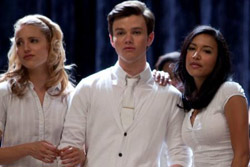
I found Sue’s story line relatable and impactful. Here is this mean woman whose life’s goal is to torture everyone around her. Rather than seeing her that way in this episode, we saw a woman who has been burnt. She pleaded with G-d to help her sister and G-d did not deliver the way she wanted. As a child, her perception was that G-d wasn’t listening or didn’t exist. But maybe she didn’t see how G-d was working in her life? We see her sitting with her disabled sister and asking her sister if she believes in G-d. In the end, the disabled sister offers to pray for Sue. Perhaps Sue has some ego to let go of; perhaps she needs to open her eyes to the gifts in her life. Perhaps she didn’t notice G-d’s presence in her life.
Finally, we have Mercedes. She, in the end, convinces Kurt to go to church with her. She presents this safe place for Kurt. It’s not about him. There are people around him who love him, but now it’s time to focus on his father. They sing to him, dedicate their service to his father, and the congregants hold his hand and involve him in the praying. Here we see, beautifully displayed, a community. She wraps Kurt in the strength he needs for his father. How often do we stop in our daily lives to offer support to our neighbor or friend, to share their burden? Isn’t it much easier to drive past the guy who has a flat? The lady who needs help getting up the stairs with her groceries? In the end, Kurt realizes the prayers weren’t for him or about him; rather they were for his father. Once he let go of his ego, he connected with his father. “Glee” so elegantly displayed this for us by his father waking up.
